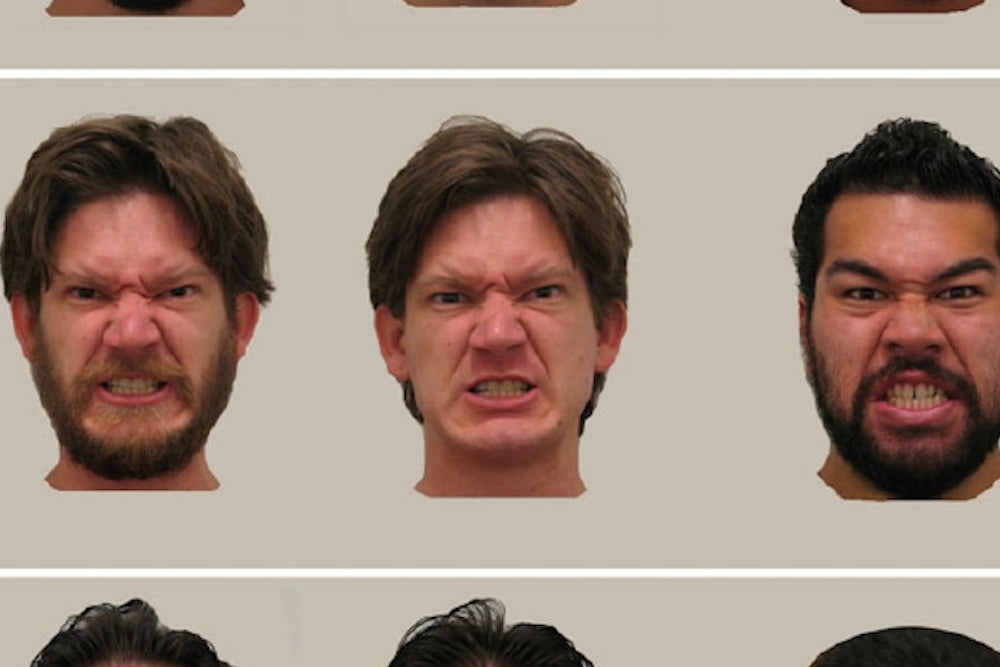At the urging of his mother and also the president, White House Press Secretary Jay Carney has shaved the much-GIF’d beard he sprouted last month. Carney may have given in to the razor, but more and more public figures seem to be forgoing it: Secretary of State John Kerry, Obama speech writer Cody Keenan and—breaking news alert—New Republic Editor Frank Foer.
Facial hair can radically alter the way a man looks, whether it’s a little stubble or a full-on beard. Carney’s and Kerry’s beards have been endlessly debated on Twitter and blogs—Do they convey authority? Are they hiding secrets?—but psychologists can tell us how we really perceive men with beards, and why men evolved to grow extraneous hair on their faces in the first place.
Why do men have beards?
Beards signal confidence because they’re disadvantageous in fights
In their 1997 book The Handicap Principle, Israeli physiologist Avishag Zahavi and her evolutionary biologist husband Amotz proposed that beards are a costly signal of male competitive ability, since they can easily be grabbed by rivals during fights. According to this theory, a man with a full beard is advertising his confidence in his own fitness: He thinks he can beat his competitors even with the “handicap” of the beard.
Beards advertise men’s health
Following a similar line of reasoning, biologists William Hamilton and Marlene Zuk suggested in a 1982 paper in Science that bearded men are advertising their healthy immune systems: Beards, like other body hair, are a known breeding ground for parasites. Recently, they’ve been shown to host bed bugs and sand fleas.
Beards might protect the face from UV rays
The idea that facial hair could play a role in regulating body temperature or shielding bodies from the sun’s radiation has been kicking around for decades—support for the theory comes from dermatologists Valerie Randall and Ebling, who showed that the rate of growth of body hair changes from season to season: Men’s beards grow 50 to 60 percent faster in the summer months than in the winter.
How are bearded men perceived?
Bearded men seem more aggressive
For a 2012 study written up in the journal Behavioral Ecology, Australian ecologist Barnaby Dixson and Canadian psychologist Paul Vasey recruited men of European or Samoan descent with full beards. Their mean age was 23, and they agreed to shave halfway through the experiment. The men were photographed bearded and clean-shaven while making neutral, happy, or angry expressions.
Dixson and Vasey then showed the “angry” pictures to over 200 men from Samoa or New Zealand, and had them guess how physically aggressive the men were. Men of both cultures judged the bearded men as significantly more aggressive than their clean-shaven counterparts.
In a separate 2008 study in the journal Personality and Individual Differences, British psychologists at Northumbria University manipulated men’s facial hair in photographs, giving them five degrees of beard— from clean-shaven to hirsute. They then had 60 women rate them on various attributes—and found that the men with full beards scored highest for perceptions of aggressiveness as well as masculinity.
People think bearded men have higher social status
Defining “social status” as the likelihood/chance that “the person in the photograph was to have a high-ranking social position and command respect over other men in the community,” Dixson and Vasey had men and women estimate the men’s social status on a scale of 0 to 5 based on photos of them in neutral expressions. The bearded men regularly received higher scores than the clean-shaven ones.
Further evidenceof a link between beards and social status comes from a 2004 paper in the journal of Britain’s Royal Pharmaceutical Society: a survey of male academics at UK universities found that full professors were “significantly more heavily bearded” than lower staff like lecturers and research fellows.
Beards can add a few years
Adolescent boys don’t need scientists to tell them that growing some stubble could help them look less like children, but it turns out the aging effects of a beard don’t disappear later in life. Vasey and Dixson had men and women guess the ages of bearded and clean-shaven men—and found that both European and Samoan men and women assumed the bearded men were “significantly” older.
Beards probably don’t make women like them more
Both Samoan and New Zealand women consistently ranked the men as more attractive when they were clean-shaven.
But they might
Researchers don’t agree on this one: Some studies have found that women do like beards. For a 1990 study in Social Behavior & Personality, psychologists showed 200 managers sketches of bearded and clean-shaven male job applicants—and found that the reviewers consistently ranked the hairy ones as more attractive, as well as more competent. And the team from Northumbria deduced that women’s favorite amount of hair was “light stubble.”
Of course, we have to allow some room for individual preference. According to White House Communications Director Jennifer Palmieri, Carney’s wife wanted him to keep it.
